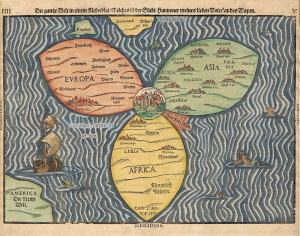By Mary Fairchild
1581 Bunting Clover Leaf Map; Israel in the center.
2 Kings 23; 2 Chron. 34:29-35:27—The king assembled all the people for a public reading of the Word of Law of God. Josiah renewed his promise to serve the Lord, and the people indicated their agreement with his promise.
THOUGH THE PEOPLE OUTWARDLY FOLLOWED JOSIAH’S LEADERSHIP, ONLY A FAITHFUL FEW, A REMNANT, SERVED GOD WITH ALL THEIR HEARTS (Jer. 3:10). As the Law was read, Josiah knew that the people had broken their promise to God through unbelief and idolatry. When he renewed his covenant with God, that renewal meant that every trace of idolatry had to be removed from the Temple, from Jerusalem, and from Judah. Although Josiah had executed a cleansing project in Jerusalem and in Judah, after reading the Law he continued to clean things up:
1) From the Temple he removed objects of Baal worship and objects related to astrology.
2) The astrologers and the idolatrous priests of Baal were killed.
3) The Baal prostitutes (male sodomites) whose tents wee in the Temple court were removed.
4) Priests were required to destroy the high places throughout Judah.
5) The place of human sacrifice to Molech, god of Ammon, in the Valley of Hinnom was destroyed.
6) Horses given to the sun god were taken away, and the chariots dedicated to the
god of the sun were burned.
7) Heathen altars built by Kings Ahaz and Manasseh in the Temple court were destroyed.
8) Sacred shrines which Solomon had erected on the hillsides for his foreign wives were smashed.
9) Samaritan altars including the center of worship in Bethel were desecrated with the bones
of their priests and destroyed (1 Kings 13:1-3).
10) All surviving calf-worshipping priests were killed, and all spiritualists and wizards with
their images and idols were destroyed.
The Feast of the Passover followed this cleansing of the land (2 kIngs 23:21; 2 Chron. 35). This Passover, described in detail by the chronicler, was the most spectacular one since the days of Samuel.
2 Kings 23:28-30; 2 Chron. 35:20-27—In 609 B.C., Pharoah-nechoh of Egypt marched north to assist the Assyrians in an attempt to stop Babylon from becoming a new world power. Josiah, who considered Assyria a more serious enemy than Babylon,went to Megiddo to stop the Egyptians.
Pharoah-nechoh sent ambassadors to intercept him. It appears that Josiah was interfering with someone else’s conflict. Since neither side had asked for his help, he should not have gotten involved in the conflict. God used an impious man to deliver His message. If Josiah had listened, his life would have been spared. But Josiah would not be persuaded to stay out of this conflict and was shot by Egyptian archers and taken back to Jerusalem where he died. WE SHOULD NOT TAKES SIDES IN OTHER PEOPLE’S CONFLICTS. IF WE DO, WE MAY END UP WITH A GRUDGE OR A BITTER SPIRIT THAT WILL DESTROY OUR EFFECTIVE SERVICE FOR THE LORD.
WORKS CITED
- Revelation and Church History
- Church Age
- Old Testament Study
- KING JAMES BIBLE
- MATTHEW HENRY COMMENTARY
- A Beka Book High School Bible Series “United Kingdom: Kings of Israel A;” 1995 Pensacola Christian College; www.abeka.com

